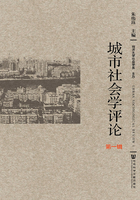
Foreword for the Special Issue of TUSR
To mark the publication of the Urban Sociological Review, I am very pleased to compliment this significant new development associated with the intellectual growth and vitality of the Sociology Department and the Center for the Study of City and Society at Tongji University. This special issue not only features the conceptual and empirical works by Tongji's own sociologists but also includes a variety of translated articles by renowned international sociologists in Japan and the United States like Sharon Zukin and John Logan. This combination represents a sensible approach to advancing the enterprise of urban sociology at Tongji. With a top-ranked College of Architecture and Urban Planning, Tongji University is best positioned to develop a broad interdisciplinary field of urban studies. Taking advantage of but moving beyond this favorable environment, Tongji's Sociology Department, through the publication of this special issue, will put the sociological approach to the study of cities on the academic landscape at Tongji and beyond. Moreover, Tongji's urban sociology has formed a small critical cluster of junior but upcoming sociologists who share complementary methodological orientations and data sources. By pulling their articles together in this special issue, these scholars send a clear message about their collective interest in collaborating further, for example the interaction between urban regeneration and social stratification to make urban studies more integral to the Sociology Department at Tongji University.
The content of this special issue reflects the dual challenge and opportunity for developing urban sociology in China, especially in Shanghai. One side of the challenge is to for urban sociology at Tongji to identify and occupy a niche in the ever expanding field of Chinese urban studies. The other side of the challenge is to forge and nourish a mutually productive relationship between urban sociology in China, Tongji in particular and the theoretical and analytical traditions and advances of urban sociology in Western contexts. This is a long-term challenge as urban sociology at Tongji and this journal are quite young. Yet their coupling presents a great opportunity for taking on this challenge and turning it into a strategic comparative advantage. Based on Shanghai, Tongji sociology and its new journal can and is using this great city to generate and develop new urban sociological projects as reflected in this special issue. Similar to Chicago in early 20th century, Los Angeles in the 1970s-80s, and New York over the past few decades, Shanghai, with its profound transformation over the last quarter century, has become a fertile ground for rich and diverse sociological inquiries into varied urban phenomena and problems such as global city making, migrants' incorporation, cultural renaissance, heritage preservation, city management, and regional integration. They allow urban sociology at Tongji and this new journal to become a new platform for producing and disseminating research findings revealing urban change that is distinctively Shanghai and broadly China. Moreover, this growing body of Shanghai-based sociological and interdisciplinary urban research at Tongji can contribute insights that will enrich a global and comparative understanding of urban dynamics.
As someone on the editorial board of this journal who is positioned to help bridge the above challenge and opportunity, I am very pleased to see the timely publication of this special issue of Urban Sociological Reviewon urban studies featuring the work of mostly sociologists. With my congratulations in order, I am also very optimistic that urban studies through the interesting and important work of Tongji's sociologists and other urbanists will continue to grow and internationalize. I am confident that this bright prospect will be reflected from time to time through the pages of this journal and other academic outlets.
(Xiangming Chen, Director of Urban and Global Studies, Trinity College, Connecticut, Oct. , 2017)